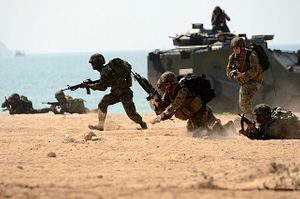On Tuesday, the United States and Thailand will kick off the 2017 iteration of the annual Cobra Gold military exercises, Asia’s largest multinational drill.
In over 30 years, Cobra Gold, which began as a bilateral drill between the United States and Thailand – Washington’s oldest ally in Asia – has now grown into one of the world’s largest multinational exercises, involving some 30 countries.
Cobra Gold 2017, the 36th iteration of the military exercise, is officially taking place from February 14 to 24, according to a statement released by the U.S. embassy in Bangkok. The opening ceremony was held in Sattahip Royal Thai Marine Corps Base in Chonburi Province, while the closing ceremony will be held in Phu Lamyai Training area in Nakhon Ratchasima Province.
This year’s exercise will feature 29 countries either directly participating in or observing. As is customary, it will be comprised of three primary events: a staff exercise which includes a senior leader seminar; a field training exercise that includes a variety of training events to strengthen regional relationships and enhance interoperability; and humanitarian civic assistance projects in Thai communities.
Despite this being a multinational exercise, much of the focus over the past few years has been on the level of U.S. involvement in the exercise. As I have written previously, since a May 2014 coup in Thailand, the United States has been attempting to balance both signaling its disapproval at the coup while also preserving defense engagements critical to its alliance with Thailand as well as its commitment to the Asia-Pacific more generally (See: “Exclusive: Managing the Strained US-Thailand Alliance”). With respect to Cobra Gold, after much deliberation the Obama administration decided to continue a scaled down U.S. involvement in the 2016 military drill (See: “US-Thailand Relations and Cobra Gold 2015: What’s Really Going on?”).
This year, the United States will have approximately 3,600 personnel from the U.S. Army, U.S. Navy. U.S. Marine Corps, and the U.S. Air Force directly participating in the various events, according to the U.S. Pacific Command. This is roughly the same number that Washington has sent in the two previous years since the coup. U.S. Pacific Command chief Admiral Harry Harris is also attending this year, making him is the highest-level of U.S. officer to join the drills since the coup.
The Thai side has been playing up the high level of U.S. participation in the exercise this year. U.S. officials, for their part, have continued to highlight the fact that Cobra Gold participation will continue to be limited until the restoration of a democratically-elected civilian government, which as of now looks unlikely until 2018 (See: “Why is Thailand Delaying Elections Until 2018?”).

































